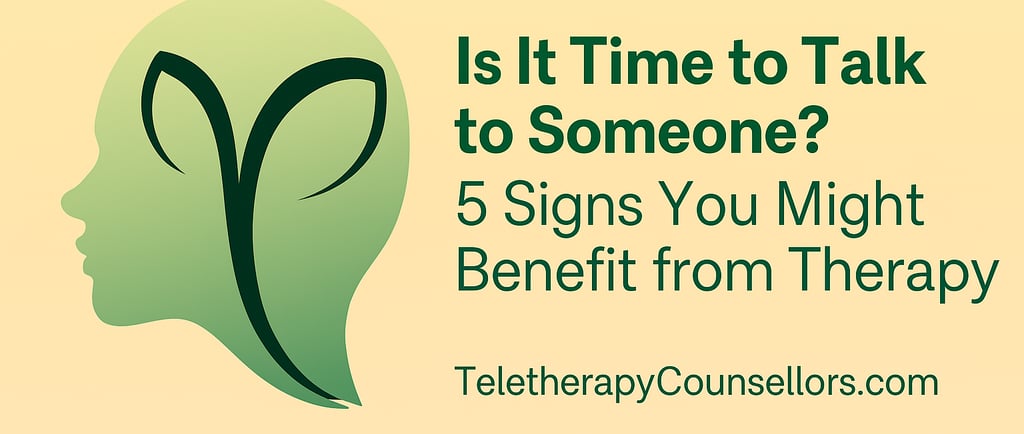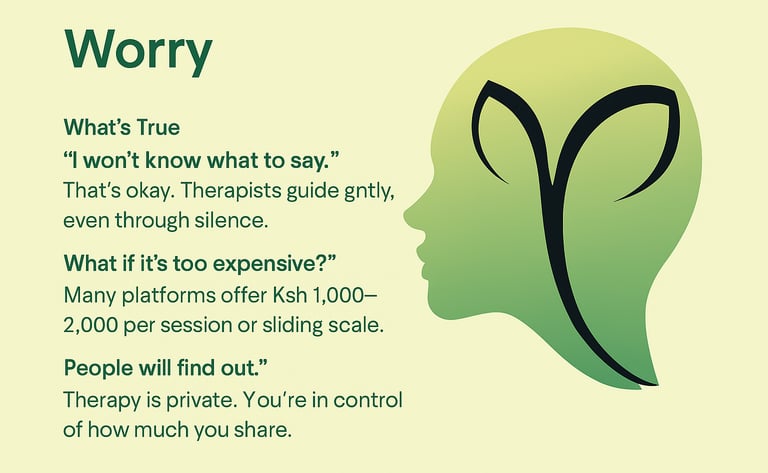Is It Time to Talk to Someone? 5 Signs You Might Benefit from Therapy in Kenya
Struggling in silence? Discover 5 signs you may need therapy in Kenya, and how Kenyan women are reclaiming their peace through professional mental health support.
7/4/20255 min read


“You’re blessed, so what’s wrong with you?”
It’s 10 PM in Nairobi. You’ve muted the school mums’ WhatsApp group, tucked children into bed, then… silence. But your mind? It’s still buzzing.
You’ve been pushing through. Telling yourself, "I’m fine. Just tired. It’ll pass."
But something feels off lately. Life in Nairobi is demanding, you’re juggling work, family, relationships, bills, and still trying to stay grounded in a city that rarely slows down.
Maybe the smile doesn’t come as easily. Maybe your heart sinks just a little every Monday. Or maybe, in the quiet moments, you find yourself feeling… empty. Heavy. Alone.
So how do you know when it’s more than just a bad week? When is it time to talk to someone?
In this guide, you’ll discover 5 powerful signs therapy might help you reclaim your calm, your confidence, and your joy.
Plus real-life insights, culturally relevant reflections, and encouragement designed for Kenyan women navigating today’s world.


1. You’re Tired All the Time, And It’s Not Just Physical
(Mental Burnout in Nairobi Life)
You’ve created routines to survive: wake up early, juggle WhatsApp messages, run errands, manage home and work. You’ve become resourceful, resilient. But something inside feels like it’s unraveling.
This is not simple tiredness, it’s burnout. It’s emotional exhaustion eating away at your spark.Waking up tired. Dragging yourself through the day. Feeling like you’re living in a fog.
Sound familiar?
Burnout is not just for CEOs and executives. For many women in Kenya, burnout comes quietly, from caregiving, trying to be everything to everyone, or simply surviving in a fast-moving city.
We hear phrases like "Kuwa strong mama," or "God will give you strength," and while those words offer comfort, they can also silence our pain.
Therapy gives you breathing space again. To unload. To figure out why everything feels so heavy, and how to feel lighter.
“Women are expected to hold the world together. But who holds them?” ,-Anonymous Kenyan therapist
2. You’re Overwhelmed by Emotions (Or Numb to Them)
Your mind rewinds and replays the same worries: school fees, a snide comment at work, misread silences. Thought after thought, replayed over and over.
Some days you might cry over something small. Other days you feel nothing at all.
In Kenyan culture, we often downplay emotions: "Don’t be dramatic," or "Uko na feelings mingi sana."
But emotions are signals. Being too emotional, or not emotional at all, can mean your inner world is trying to get your attention.
Therapy is not about "fixing" you. It’s about helping you listen to yourself more clearly. To recognize what your body, your heart, and your soul might be trying to say.
Real client reflection: “Before therapy, I thought feeling was weakness. Now I know it’s wisdom.”

3. You’re Struggling with Relationships (And You're Tired of Pretending)
You wake up. You do the things. You answer “fine.” You wear your strength like armor.
Inside, there’s emptiness. No joy. No pain. Just a blur.
Sometimes, it feels like you’re walking on eggshells with your spouse, children, parents and even colleagues.
. Or maybe you’re constantly giving, and no one seems to notice you’re running on empty.
You may wonder, *"Is it me? Am I too sensitive? Why do I feel invisible?"
Therapy offers you a place to untangle those relationships. To learn healthy boundaries, better communication, and how to protect your peace.
Whether you’re married, single, separated, or in-between, it’s okay to want relationships that feel safe and supportive.
“In therapy, you learn boundaries aren't walls, they're bridges to healthier love.”
4. You’re Haunted by the Past or Anxious About the Future
You once had hobbies, community, creativity. Cooking, laughter, faith. Now those things feel heavy, empty or distant.
That’s identity fatigue, losing sight of who you are beneath the roles of mother, provider, daughter. Maybe something happened that you’ve never fully healed from, a loss, a betrayal, a moment you can’t forget.
Or maybe you’re always on edge, imagining the worst:
What if I lose my job?
What if I fail as a mum?
What if they leave me?
In therapy, you can learn how to process pain from the past and calm the worries about the future.
It’s not about pretending everything is okay. It’s about learning that you’re safe now, and you have more control than you think.
“I was reliving my trauma every day. Therapy gave me the tools to finally live in today.” , Kenyan mother of two
5. You’re Wondering, “Is This All There Is?”
(When Life Feels Empty Despite Doing Everything ‘Right’)
You’ve ticked the boxes: job, kids, maybe even a marriage. But something still feels... unfulfilled.
This feeling is more common than you think, especially among women in Kenya navigating modern pressures with traditional expectations.
You’re the person people lean on. Crisis-tested. Prayer-fighter. Always strong.
But that strength came at a cost.
A viral testimonial from caregiver Viona Wamuyu recalls 11 years of nonstop care, caregiving fatigue, and deep emotional exhaustion until she reached a breaking point.
Therapy can help you reconnect with your desires. Your voice. Your why.
You’re allowed to want more than survival. You’re allowed to seek joy, purpose, and peace.
“I thought I was ungrateful. Therapy showed me I was simply unsatisfied, and I could change that.”
What Might Be Holding You Back—And Why It Doesn’t Have To


What If It’s Just a Phase? (And Other Common Objections)
We get it. You may be thinking:
"Maybe I’m overreacting."
"What if people think I’m weak?"
"I should just pray harder."
Let’s pause there.
Therapy and faith are not enemies. In fact, many women find that therapy strengthens their spiritual lives.
And seeking support doesn’t make you weak. It makes you wise. Strong women ask for help. Smart women know when to take a break, recalibrate, and refill their emotional tank.
"Therapy taught me to combine prayer with practical steps. Both are powerful." , Client testimonial
You Deserve Support, Right Here, Right Now
Recent data shows a silent epidemic of burnout in Kenya—68% of professionals report emotional exhaustion, and mental health issues now account for 13% of the country’s disease burden.
There’s momentum: grassroots peer groups, faith leaders speaking openly, and platforms making therapy discreet, affordable, and culturally attuned.
Kenyan women are beginning to reclaim mental wellness, and some are doing it—quietly, privately, and brilliantly.
You don’t have to wait until everything falls apart to talk to someone.
You don’t need a crisis. You need a moment of honesty.
And if you’re already reading this, maybe this is your moment.
Whether you’re dealing with anxiety, stress, emotional exhaustion, or just feeling stuck, our licensed Kenyan therapists at Teletherapy Counsellors are here to help.
All our sessions are discreet, culturally sensitive, and designed with you in mind. You don’t even have to leave your home.
What Healing Feels Like—Even After One Conversation
Imagine:
A therapist asks, “Where does it feel stuck?” You share one heavy sentence.
They listen—without rushing, without fixing. You end the session lighter, clearer, quieter inside.
Healing isn’t about dramatic breakthroughs. It’s about small shifts. And it starts with connection.
Let’s Talk, Privately, Safely, and on Your Terms. Booking a session doesn’t mean you’re broken. It means you’re brave enough to start again. So, is it time to talk to someone?
Maybe. Maybe not. But if even a small part of you is curious… let’s talk.
You deserve to feel better. Let’s take that first step, together.
Loved this post? Share it with a woman who might need to hear this today. Or sign up below to get weekly tips, encouragement, and resources for your healing journey.
